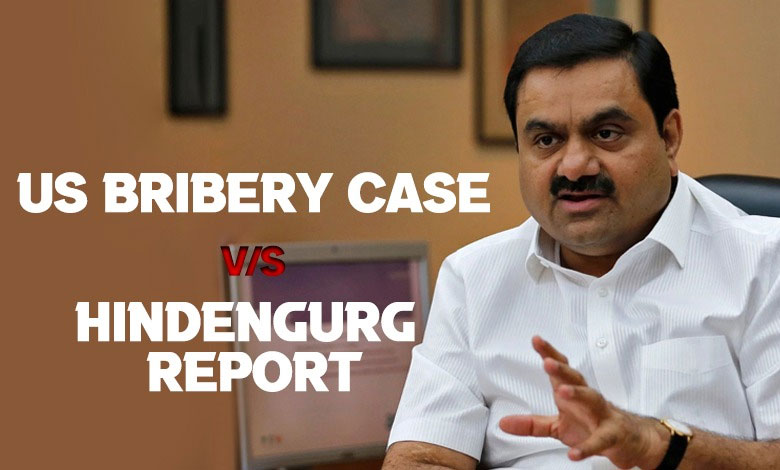Adani Group Bribery Case: Why the Latest US Court Filings Are a Bigger Threat Than Hindenburg Report
New allegations against the Adani Group have surfaced in the United States, as a federal court in Brooklyn filed a criminal indictment against the Indian business conglomerate’s top executives. The charges, which include bribery, securities fraud, and corruption, are far more serious than previous accusations leveled by the Hindenburg Research in 2023.

Brooklyn, USA – New allegations against the Adani Group have surfaced in the United States, as a federal court in Brooklyn filed a criminal indictment against the Indian business conglomerate’s top executives. The charges, which include bribery, securities fraud, and corruption, are far more serious than previous accusations leveled by the Hindenburg Research in 2023. These new allegations involve documents and conversations that allegedly show how funds raised from US investors were used to bribe Indian government officials to secure lucrative power contracts.
Table of Contents
The indictment, which was filed in November 2024, accuses several senior executives of Adani Green Energy, including Gautam S. Adani, Sagar R. Adani, and Vneet S. Jaain, of conspiring to commit securities and wire fraud. They are also charged with violating the Foreign Corrupt Practices Act, which is designed to prevent bribery and corruption in global business dealings. The court documents highlight an elaborate scheme involving over $250 million in bribes paid to Indian government officials to secure power contracts, including one of the world’s largest solar energy projects.
Allegations of Bribery and Corruption
The new charges focus on the bribery scheme that allegedly involved senior Adani executives paying bribes to Indian officials in exchange for state contracts worth billions of dollars. According to the indictment, between 2020 and 2024, the defendants orchestrated a plan to pay over $250 million in bribes to secure solar energy supply contracts from the Indian government. These contracts were expected to generate more than $2 billion in profits over a 20-year period, making them highly lucrative for the Adani Group.
Gautam Adani, along with other business executives, is accused of personally meeting with Indian officials to discuss the bribery scheme. The court filings suggest that these meetings were meticulously documented, with some defendants using their phones to track bribe payments and discuss the execution of the scheme via messaging apps.
Bribery Scheme to Secure Solar Power Contracts
The indictment also details how the bribes led to the signing of power sale agreements (PSAs) with Indian electricity distribution companies. Between July 2021 and February 2022, several Indian states, including Odisha, Jammu and Kashmir, Tamil Nadu, Chhattisgarh, and Andhra Pradesh, entered into PSAs with Solar Energy Corporation of India (SECI) under the Manufacturing Linked Project. Notably, the state of Andhra Pradesh agreed to purchase over seven gigawatts of solar power, the largest purchase from any Indian state or region.
A Shift from Stock Manipulation to Bribery
This new case comes nearly two years after Hindenburg Research published its bombshell report in January 2023, accusing the Adani Group of stock manipulation, accounting fraud, and related-party transactions. The Hindenburg report led to a dramatic drop in Adani Group’s stock prices and prompted investigations by Indian authorities.
While Hindenburg’s charges were primarily related to market manipulation and undisclosed financial dealings, the latest US court filings focus on more severe criminal behavior: bribery and fraud involving government officials. This shift underscores the gravity of the current allegations, as they now implicate government corruption at the highest levels in India.
Documents and Communications Reveal the Scheme
The court filings present substantial evidence of the bribery conspiracy, including documents, electronic messages, and conversations among the accused. For instance, Sagar R. Adani allegedly used his phone to track details of the bribes offered to Indian officials, while Vneet S. Jaain photographed documents summarizing the amounts owed for bribe payments. The defendants also exchanged detailed presentations on how to conceal the bribe payments using PowerPoint and Excel.
Adani’s Response to the Allegations
The Adani Group has denied the new allegations, calling the claims “false and misleading.” In a statement, the company stated that it would vigorously defend itself against the charges and is committed to full transparency. “We have always complied with local and international laws, and we will continue to cooperate fully with all regulatory authorities,” the company said.
Also Read: Over 50 Killed in Gun Attack on Passenger Vehicles in Pakistan’s Khyber Pakhtunkhwa
However, the seriousness of the charges has raised concerns about the potential legal and financial repercussions for the Adani Group. If found guilty, the executives involved could face significant penalties under both US and Indian law, potentially impacting the group’s global operations and reputation.
Global Impact of the Allegations
The US court filings have drawn significant attention from global investors, legal experts, and regulators. The case has already sparked discussions about the integrity of international business practices, particularly in emerging markets like India. The involvement of US investors, including major financial institutions, in the alleged fraud makes the case particularly significant, as it highlights the risks associated with cross-border investments in developing economies.
As the case unfolds, it is likely to have broader implications for both the Adani Group and the global financial community. With the US Securities and Exchange Commission (SEC) and the Federal Bureau of Investigation (FBI) involved in the investigation, further legal action could follow, potentially impacting the Adani Group’s access to capital markets in the US and other international financial hubs.
